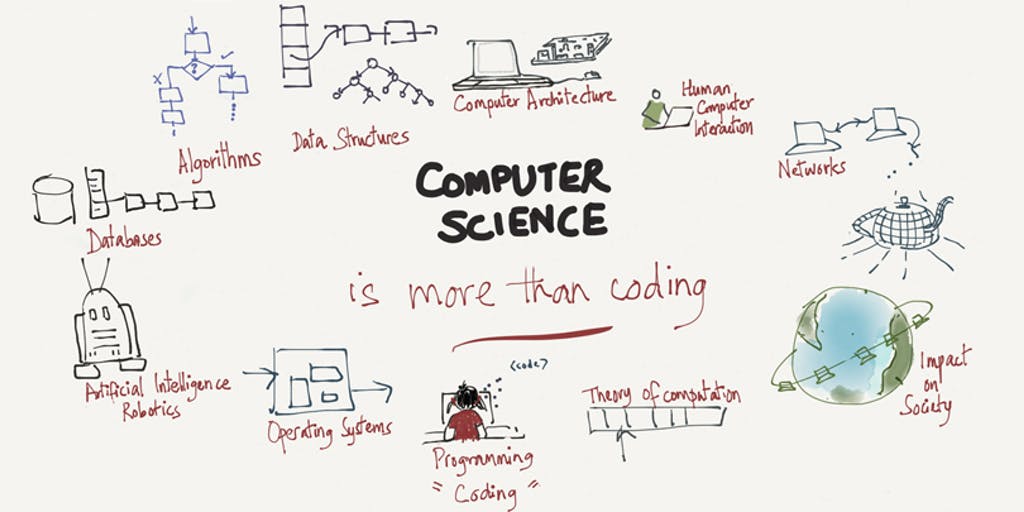How is Computer Science Used in Entertainment
Computer science is used in entertainment for creating special effects and virtual reality experiences. It also powers animation, video game development, and streaming platforms.
In the entertainment industry, computer science plays a crucial role in shaping the way we consume and interact with media. From the special effects that bring movie scenes to life to the realistic graphics in video games, computer science is at the heart of it all.
Additionally, the development of streaming platforms and virtual reality experiences further demonstrates the impact of computer science on entertainment.
As technology continues to advance, computer science will undoubtedly continue to play a key role in shaping the future of entertainment.
Through the integration of innovative technologies, entertainment experiences will become more immersive and interactive, captivating audiences in new and exciting ways.

Credit: www.chegg.com
The Evolution Of Computer Science In Entertainment
Computer science has revolutionized the entertainment industry, driving advancements in visual effects, gaming, and virtual reality. From lifelike CGI to immersive experiences, computer science continues to shape and enhance the way we enjoy entertainment.
Early Beginnings
In the early days, Computer Science was used in entertainment for basic tasks.
Technological Advancements
Technological advances have revolutionized how computer science is utilized in entertainment today.

Credit: www.latinasinstem.com
Role Of Computer Science In Video Games
Computer science plays a crucial role in shaping the world of video games, enabling developers to create immersive experiences for players. With advancements in technology, graphics, animation, and the overall game development process have greatly evolved. Let's delve into how computer science is applied in these areas.
Graphics And Animation
The field of computer graphics and animation is essential for creating visually stunning video game environments and characters. Through complex algorithms and programming techniques, developers can generate realistic 3D models, lifelike animations, and vibrant textures. This level of realism enhances the player's immersion and contributes to an engaging gameplay experience.
Computer scientists utilize graphics libraries and frameworks, such as OpenGL and DirectX, to render and display visuals in real-time. These tools enable efficient processing of graphical data, including rendering lighting effects, shading, and particle systems.
By implementing algorithms like ray tracing and rasterization, game developers can achieve high-quality visuals, replicating real-world physics and effects in virtual environments.
Beyond aesthetics, computer science also assists in optimizing game performance. Through techniques like level of detail (LOD), developers can dynamically adjust the graphical complexity based on the player's proximity to objects. This approach allows for smoother gameplay by reducing the computational load.
Game Development Process
The game development process involves a series of stages, from initial concept design to final product release. Computer science is employed throughout these stages to enable efficient and effective development.
- Design and Planning: Computer science aids in conceptualizing the game mechanics, storyline, and overall structure. Developers utilize programming languages like C++, Java, or Python to create prototypes and plan the game's logic.
- Programming: Once the game mechanics are determined, computer scientists write the code that brings the game to life. This includes creating character movement, enemy behavior, physics simulations, interactive objects, and user interfaces.
- Testing and Debugging: Computer science is vital during the testing phase to identify and fix any bugs, glitches, or performance issues. Through debugging tools and techniques, developers can ensure smooth gameplay and prevent crashes.
- Deployment and Distribution: Computer science plays a significant role in packaging and distributing finished games. Developers utilize automated processes and tools to compile the game's code, create installers, and package assets for different platforms.
By employing computer science principles and techniques in these areas, video game developers can create captivating and user-friendly experiences for gamers worldwide.
Computer Science Applications In Film And Animation
Computer science plays a significant role in the world of entertainment, particularly in the realms of film and animation. The integration of computer science technologies has revolutionized the way visual effects are created, and digital animation techniques have opened up a world of endless creative possibilities.
In this blog post, we will delve into the various computer science applications in film and animation, focusing on special effects and digital animation techniques.
Special Effects
Special effects in the film industry have been greatly enhanced by the integration of computer science. From creating realistic explosions to simulating otherworldly environments, computer-generated special effects have become a staple in modern filmmaking. The advancement of computer science has allowed filmmakers to bring to life complex and visually stunning scenes that were previously unimaginable.
Digital Animation Techniques
Digital animation techniques have transformed the film and entertainment industry, enabling creators to craft immersive and captivating visual experiences. Through the use of computer science, animators are able to manipulate and bring characters and environments to life, providing audiences with visually stunning and engrossing storytelling.
The blend of artistry and computer science has given rise to a new era of animation that continues to push the boundaries of creativity and innovation.

Credit: www.cmu.edu
Integration Of Computer Science In Virtual Reality (vr)
When diving into the world of entertainment, the integration of computer science in virtual reality (VR) stands at the forefront. VR has revolutionized the entertainment industry with its innovative and immersive experiences, enriching the way we perceive and interact with digital content.
Immersive Experiences
Virtual reality (VR) delivers unparalleled immersive experiences, transporting users to simulated environments that can range from fantasy worlds to historical settings and futuristic landscapes. Through the clever integration of computer science, VR technology creates a sense of presence and interaction, captivating users in a way never before possible.
Vr Development Tools
The development of VR experiences depends on sophisticated tools and software firmly grounded in computer science principles. Cutting-edge algorithms and programming techniques are employed to create realistic simulations, incorporating 3D rendering, spatial audio, and motion tracking for an authentic and compelling virtual environment.
Impact Of Computer Science In Music Production
Computer science has had a significant impact on the field of music production, revolutionizing the way music is composed, recorded, and produced. With the advent of digital technology, musicians and producers now have access to a wide range of tools and techniques that were previously unimaginable. In this blog post, we will explore the various ways in which computer science is transforming the music industry.
Digital Audio Workstations
Digital Audio Workstations (DAWs) are powerful software applications that serve as the centerpiece of modern music production. These sophisticated tools allow musicians and producers to record, edit, and manipulate audio in ways that were once only possible in expensive recording studios.
With the help of DAWs, artists can now create music on their laptops, eliminating the need for expensive hardware and physical recording equipment.
DAWs provide a wide range of features and functionalities, from multi-track recording to advanced audio editing and mixing capabilities.
Through the use of drag-and-drop interfaces and intuitive user interfaces, artists can easily arrange different musical elements, layer sounds, and apply various effects to create a polished and professional sound.
Sound Synthesis
One of the most exciting advancements in music production brought about by computer science is sound synthesis. Sound synthesis allows musicians to create unique and complex sounds that add depth and character to their compositions.
Unlike traditional instruments that produce sound through physical vibrations, electronic synthesizers generate sound using algorithms and software.
By manipulating parameters such as oscillators, filters, and envelopes, artists can create a vast array of sounds that mimic real-world instruments or delve into entirely new sonic territories. Moreover, computer science has given rise to virtual instruments, which are software versions of traditional instruments, allowing musicians to have access to a vast library of sounds without needing to own or play the physical instruments.
These advancements in sound synthesis have not only expanded the creative possibilities for artists but have also made music production more accessible and affordable. With just a computer and a MIDI controller, musicians can produce high-quality music without the need for expensive and bulky hardware.
Overall, computer science has revolutionized music production by providing musicians and producers with the tools and techniques necessary to create professional and innovative music. From digital audio workstations to sound synthesis, these advancements have opened up new opportunities for artists and have transformed the landscape of the music industry.
Utilization Of Computer Science In Streaming Services
Computer Science plays a pivotal role in enhancing streaming services, shaping user experiences through personalized recommendations and efficient content delivery algorithms.
By leveraging machine learning and data analytics, entertainment platforms optimize performance and cater to evolving consumer preferences in real-time.
Content Delivery Networks
Content Delivery Networks (CDNs) optimize streaming speed by distributing content to servers closer to users.
Personalized Recommendations
Personalized Recommendations are created using machine learning algorithms to suggest content tailored to individual preferences.
Computer Science Contributions To Augmented Reality (ar)
Ar Applications In Entertainment
Augmented Reality (AR) revolutionizes entertainment through interactive experiences.
Ar Development Platforms
Developers utilize AR platforms like Unity and ARKit to create immersive content.
Challenges And Future Opportunities For Computer Science In Entertainment
Computer science plays a pivotal role in entertainment, encompassing a wide array of applications that have redefined the industry. As technology advances, it brings forth both challenges and opportunities, particularly in areas like data security concerns and artificial intelligence integration.
Data Security Concerns
Data security has become a paramount concern in the entertainment sector, given the vast amounts of sensitive information being processed and stored. With the increasing reliance on digital platforms for content delivery and management, the need for robust security measures is more critical than ever.
The challenge lies in protecting valuable intellectual property, consumer data, and privileged information from potential breaches, piracy, and unauthorized access.
Artificial Intelligence Integration
The integration of artificial intelligence (AI) presents a myriad of opportunities in the entertainment industry. AI-powered algorithms are revolutionizing content creation, personalization, and recommendation systems, enriching user experiences.
However, the challenge remains in ethical considerations and maintaining human creativity amidst the growing influence of AI. Striking a balance between automation and artistic expression is crucial for the seamless integration of AI in entertainment.
Frequently Asked Questions Of How Is Computer Science Used In Entertainment
What Role Does Computer Science Play In Entertainment?
Computer science is leveraged in entertainment for animation, special effects, and virtual reality experiences.
How Is Computer Science Used In Video Game Development?
Computer science contributes to game design, programming, and artificial intelligence implementation in video games.
What Impact Does Computer Science Have On Movie Production?
Computer science enhances movie production through CGI, digital editing, and virtual set creation.
How Does Computer Science Influence Music And Audio Production?
Computer science revolutionizes music and audio production with digital synthesizers, mixing software, and sound engineering tools.
In What Ways Does Computer Science Contribute To Virtual Reality Experiences?
Computer science shapes virtual reality with 3D modeling, environment rendering, and interactive simulations for immersive experiences.
Conclusion
Computer science plays a pivotal role in the world of entertainment, revolutionizing various aspects like visual effects, animation, and game development. By harnessing the power of algorithms and programming languages, computer scientists create immersive virtual environments, stunning graphics, and seamless gameplay experiences.
From cutting-edge CGI in movies to compelling video games, computer science has paved the way for endless possibilities in the entertainment industry. As technology continues to advance, we can expect even more exciting innovations that push the boundaries of creativity and imagination.
Embracing computer science in entertainment has truly transformed the way we consume and experience media.





